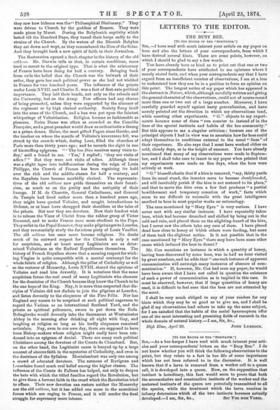LETTERS TO THE EDITOR.
THE BUSY BEE.
[TO THE EDITOR OF THE "SPECIVITOR.")
Sin, --I have read with much interest your article on my paper on bees and also the letters of your correspondents, from which I have derived several hints. There are some points, however, on which I should be glad to say a few words.
You have already been so kind as to point out that one or two of your correspondents have attributed to me opinions where I merely stated facts, and when your correspondents say that I have argued from an insufficient number of observations, I am at a loss to understand how they can be in a position to form an opinion on this point. The longest notice of my paper which has appeared is the abstract in Nature, which, although carefully written and giving the general character of the observations, could not of course record more than one or two out of a large number. Moreover, I have carefully guarded myself against hasty generalisation, and have merely pointed out the direction in which my observations tend, while courting other experiments. " G." objects to my experi- ments because some of them " run counter to instead of in the lines of the special instincts and habits of the bee community." But this appears to me a singular criticism ; because one of the principal objects I had in view was to ascertain how far bees could adapt themselves to conditions external to the usual " lines" of their experience. He also says that I must have worked either on cold, cloudy days, or in the height of summer. You have already mentioned that many of my observations were made in Septem- ber, and I shall take care to insert in my paper when printed that my experiments were made on fine days, when the bees were actively at work.
" G." himself admits that if a hive is removed, " say, thirty yards from its usual stand, the inmates seem to become dumbfounded, and will inevitably perish if the hive is not restored to its place," and that to move the hive even a few feet produces "a partial bewilderment and temporary cessation of work," facts which seem to me difficult to reconcile with the great intelligence ascribed to bees in most popular works on entomology.
The case mentioned by " Mary Eyre " is very curious. I have never met with any similar instance. I have repeatedly taken bees, which had become drenched and chilled by being out in the cold and rain, and placed them on the alighting-board of the hive, but I never saw the others take any care of them. I have placed dead bees close to honey at -which others were feeding, but none of them took the slightest notice. Is it not possible that in the case mentioned by " Mary Eyre" there may have been some other cause which induced the bees to desert ?
Mr. Cox mentions an instance in which a quantity of honey, having been discovered by some bees, was in half an hour visited by great numbers, and he adds that " one such instance of apparent communication will outweigh many instances of absence of com- munication." lf, however, Mr. Cox had seen my paper, he would have been aware that I have not called in question the existence of such a power of communication as is implied in this case. It must be observed, however, that if large quantities of honey are used, it is difficult to feel sure that the bees are not attracted by the scent.
I shall be very much obliged to any of your readers for any hints which they may be so good as to give me, and I shall be glad if my observations lead others to take up the same subject, for I am satisfied that the habits of the social hymenoptera offer one of the most interesting and promising fields of research in the whole domain of natural history.—I am, Sir, &c.,


































 Previous page
Previous page